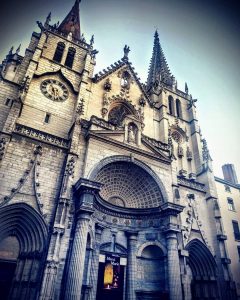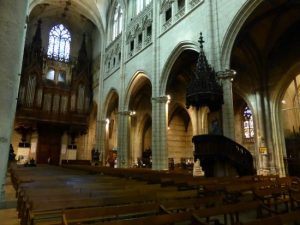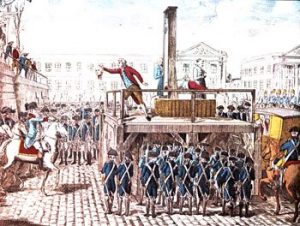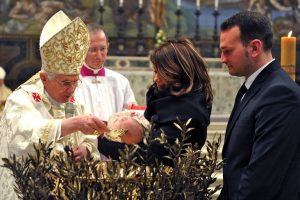St. Nizier Church in Lyons

 The Gift of Baptism [line 5 of the map]
The Gift of Baptism [line 5 of the map]
Brother Maurice’s map, after first recounting the initiatives of the Father and the Son, in line 5 uses we for the first time. Here we  become protagonists: we believe and make an act of faith
become protagonists: we believe and make an act of faith
— that the first four lines of the map are God’s truth,
— that love is God’s being and defining word,
— that Jesus is God made flesh come to earth to accomplish a divine mission.
“We have been baptized …”
So that we can probe the importance of line 5, the next stop in our voyage is the baptistery of St. Nizier Church in Lyons, where Andre Coindre was baptized two days after his birth. We enter St. Nizier in spirit to pray for the grace to come in touch with the imperceptible sacramental moment at which our spirituality was born. It all started at the baptism of our founder. Let us re-create the scene.
 We enter into the Gothic church.[1] Its colonnaded interior awakens all our senses. The baptistery is to the left after entering the main door. Present beside his father Vincent and his mother Mary Mifflet are his godparents: André Moine, a family relative, and Frances Déduit, an aunt on his mother’s side. The baptizing priest is Anthony Joseph Lernoix, who reverently celebrates the traditional Catholic rite of infant baptism over the font and signs the register.[2]
We enter into the Gothic church.[1] Its colonnaded interior awakens all our senses. The baptistery is to the left after entering the main door. Present beside his father Vincent and his mother Mary Mifflet are his godparents: André Moine, a family relative, and Frances Déduit, an aunt on his mother’s side. The baptizing priest is Anthony Joseph Lernoix, who reverently celebrates the traditional Catholic rite of infant baptism over the font and signs the register.[2]
The Risk of Baptism
The scene sounds routine enough, but a fact discovered by Brother Jean Roure gives us a glimpse of how much strife surrounded this simple sacramental act. When Andre was five, “in August 1792, the good priest [Father Lernoix] fell victim to the revolution; his body was mutilated, and his head was borne aloft on a pike and left hanging on a linden tree in Place Bellecour,” the principal city square.
The revolution had radicalized religious tensions between Catholics and Protestants by fully legalizing Protestantism and providing for its reestablishment. Harrowing confrontations ensued between the two confessions over taking possession of churches and occupying territories or towns formerly dominated by one or the other. After the revolution, violent polarization turned baptism into a political statement that provoked mutual recriminations. Many churches became crucibles of intolerance in a way not unlike those in Mississippi during the Jim Crow era.
It was not until Andre was ten years old that Napoleon’s concordat with the pope sought to put an end to religious violence by laying out specific terms of coexistence guaranteed to protect both Catholic and Protestant religious communities.[3] All this goes to say that during the lifetime of Andre Coindre baptism and faith confession were passionate and intentional decisions with sobering consequences.
One Baptism
If anything good came out of lynchings like those of the pastor of St. Nizier, it was state-enforced recognition and tolerance leading, over decades, to the de-dramatization of interfaith tensions. An important subsequent step, which evolved over a century, was consensus developed among the Churches that baptism is a shared sacrament of entry into Christian faith, that there is only one baptism. A third step has been the awakening of a consciousness of ecumenism. Vatican Council II was conceived and lived as an “ecumenical council” of mutual dialogue.
In the spirit of ecumenism, our schools and works, while teaching a Catholic religious curriculum, not only avoid proselytizing those of other faith communions but welcome both youth and adults of other denominations. The Zamzam survivors from multiple faith confessions, who broke through their initial suspicion of each other to develop lifelong friendships and prayer partners, show us the blessings possible from forgetting historical rivalries. As we search for a spirituality that can feed all of us, there is no better place to start than with the one baptism that we share and promote. Before there were Protestants and Catholics, Jesus gave his disciples the final commission to go to all nations and “baptize them in the name of the Father and of the Son, and of the Holy Spirit.”[4]
Out-of-control passion is certainly not the problem with baptism today. Quite the opposite, our problem is indifference to a ritual that has been domesticated into a cultural milestone relegated to a page in the family photo album. How often do we hear people say, “I’m a cultural Catholic.” Or “I was raised Baptist, but …”? Often that means “Baptism happened to me; I’ve never made too much of it.”
The pulpit in St. Nizier from which Andre would later hold his parishioners rapt is midway up the nave in a spot and at a height to amplify his already booming voice. In sermons during the parish revivals he would later preach, Andre shows us his esteem for the sacrament of baptism.
The Gifts of Baptism
The gifts God bestows on us unconditionally at baptism need adjectives like phenomenal and transformative. The sacrament enables us, in the next world, to rise with Christ to a life without end. In this world, it frees us from the power of original sin.
Just what is the power of original sin? Pope Benedict XVI talks about it this way: that the original human beings did not trust God. They cut off their relationship with him. They sowed two suspicions: that God is a rival who curtails our freedom and that we can be fully human only when we have cast God aside. Our first human ancestors did not want to owe their existence to God or to seek fullness of life from God, so they began trusting in deceit rather than in truth. [Youcat 68] They set a deadly course for us to follow.
 Benedict summarizes:
Benedict summarizes:
The network of human relationships was damaged from the very beginning. … Every human being enters into a world that is marked by relational damage. At the very moment that [we] begin human existence, … [we] are confronted by a sin-damaged world. Each of us enters into a situation in which human relationality has been hurt. Consequently, each [of us] is, from the very start, damaged in relationships and does not engage in them as [we] ought. [In the Beginning 72-73]
Jesus empowered our world to begin living free from its original damage. As Son — by nature relationship and relatedness — he re-establishes relationships. His arms, spread out on the cross, are an open invitation to a relationship continually being offered.
From the tree of Eden, Benedict continues, there came the voice of the tempter. From the tree of the cross comes a word of not temptation but of redeeming love. The Sacred Heart event, presented in Rule 114 as a birthing, waters the new tree of life. The tree of the cross becomes the true pole of the earth. It bears the fruit of the Eucharist, the fruit of true life lived in relationship. While our original ancestors disobeyed, Jesus obeyed. In that way he undid the state of original alienation. Baptism is our birth into a new world of restored possibilities for the kinds of saving relationships that were God’s plan for us from the beginning. [cf. In the Beginning, p. 76]
Well beyond the grace of abolishing the power of original sin over us, Andre Coindre proclaims baptism’s real power to consecrate us, that is to say, to prepare a space for God in us. He preached:
“By the character of baptism, the baptized have a mission to fulfill, for they are living members of Christ, who on the altar is both sanctifier and victim. The baptized must be, like their divine head, victim and sanctifier: victim by admitting to God their weakness of body, spirit and heart; sanctifier by uniting their own sufferings to those of the sacred host which is broken in the name of the Church and for the whole Church.”[5]
In our desire for a shared spirituality accessible to diverse denominations, we put emphasis on the last four words.
Andre’s Faith in Baptism
Andre received his faith that baptism makes us “like our divine head” from the Fathers of the Church. Origen understood all spirituality as the full flowering of Christ’s union with the soul that begins at baptism. He taught that baptism transforms our soul into something “better than a soul,” into an incorruptible spirit in God’s image and likeness. “The one God makes those in whom he dwells gods, the one Christ makes us, his adopted brothers and sisters, into christs, and the Holy Spirit makes us holy spirits.”[6] The deifying result of baptism in us makes it hard for us to tell where God ends and where we begin.
In our map Brother Maurice quotes the scriptural basis of Origen’s teaching: baptism makes us “partakers in the divine nature” (line 5). The mystery of God’s indwelling within us is fundamentally a participation in the personal life of the Trinity. That is an exhilarating truth which bears further meditation.
Being a baptized Christian confers a spiritual identity so deep and so radical that it revolutionizes everything. Because baptism consecrates us, we are potentially God’s presence in every context through which our lives pass. A native American poet described our potential this way: “Unending faith precedes glittering possibilities.”[7] Baptism is far from a mere rite of passage for Church membership. It brings about the real indwelling of the Spirit of God within us.
Baptism is also the event at which we receive the personal gift of our salvation. The fact that we are baptized as infants, unable to accomplish anything on our own, makes it plain that salvation is an unconditional gift, not a reward for a lifetime of good behavior. God saved us and entered our spirit before we could do anything to merit saving grace. Remember that God saved the chosen people by passing them through the waters of the Red Sea before Moses gave them the Law. Our present attempts as adults to make sense of our own spiritual strivings are prompted by the allure of God within us beginning at baptism. All this means that our participation in God’s divine nature is a dynamism that saturates our whole being. The grace of our baptism impels us to do and be better than we are in all of our activities: relationships, work, civic duties, play, and business.[8]
Baptism reveals how God sees us. In a word, through baptism God tells us that we have a sacred heart.
Faith and Trust in Baptism
Alongside the gifts that the Fathers and theologians of the Church describe as the fruits of baptism, Andre received an extraordinary grace that marked him uniquely, one we refer to as his charism: a special ability to look upon children and young people the way God does. Andre looked upon each child as a sacrament in the same shocking way Jesus did.[9] As pastor, he celebrated multiple baptisms and signed many parish baptismal records, perceiving that children participate in the divine nature in a most remarkable way: they have noble hopes and an eternal destiny. He channeled Jesus’ special love for children such that he was able to gaze through the eyes of God beyond their irresponsible behaviors into the sacredness of their heart. The heart of his charism was his being endowed with an intuitive capacity to perceive the wondrous effects of baptism even when cruel circumstances and the children themselves conspired to obscure it.
Baptismal dignity of youth
Andre asserted in personal ways his pedagogy of trust in each youngster’s baptismal dignity, as when he wrote a confidential letter to Brother Borgia about how to handle–avoiding expulsion–the indefensible behavior committed by an older boy, Lespinasse, who went AWOL from the dorm overnight. Andre asserted it also in public ways. As he preached in parish missions he gave talks to parents, who, not unlike Jesus’ disciples, often treated children with neglect and indifference or, worse, with mistrust. For example, among the counsels he gave was this reaction to a father’s comment:
“They are only children.” Yes, children, but with enough intelligence to learn to speak their language in less time and with more exactness than much more learned men take to learn dead languages despite their diligence, the maturity of their years, and their adult depth of thought. They are children who, despite what was at first an onslaught of confused sounds striking their ears, require just a few encouraging signs to discern the meaning of individual words and apply them to objects whose images they trace. They are children; yes, children whose brains, full of soft matter, receive more easily and more deeply all the stimuli we give them; children whose curiosity is all the more active because their knowledge is so limited. They notice everything, observe everything, and even guess things that are only half expressed.[10]
Andre directed his charismatic gaze especially toward youth in distress. The diocesan authorities were critical of him, complaining that he spent too much time creating and supervising programs to protect children: “He is wasting a first class talent as a preacher on an establishment for boys which he bought with his own money.” The sanctuary he founded, Pieux-Secours,[11] addressed a specific need that until then no one had seen fit to tackle, namely, the care of young offenders upon their release from prison. It is interesting to note that in order to justify this work to his superiors and to convince eventual contributors of the need for it, Andre did not hesitate to write a text five times longer about the boys who needed rehabilitation than about the ones with only developmental deficits.
The most noteworthy aspect of Andre’s charism was a special concern for young offenders, who clearly made an impression on his apostle’s heart. In the fundraising brochure he wrote to publicize the Pieux-Secours sanctuary, he takes pains to relativize their youthful misdemeanors before articulating the main principle of his pedagogy based on trust, a ringing endorsement of the grace of their baptism: “Hope for their transformation must never be lost.”[12]
7
St. Nizier Church
The Gift of Baptism [line 5]
Prayer, Reflection, and Exchange
The Grace I Seek …
I pray for deeper faith in the gifts of baptism.
Father, how sublime and mysterious are the gifts of my baptism! You enable me to participate in your divine nature so that I can hardly tell where you end and I begin. Strengthen my faith so that I may see myself as you see me. Give me eyes to perceive myself as a new creation charged with your breath of eternal life and joyful hope for prayerful union with you.
Composition of Place – Spend some time in Saint Nizier Church
http://www.patrimoine-Lyons.org/uploads/panoramiques/VV_AffStNizier_LUO.htm
My Baptism: How God Sees Me
I go in spirit to the parish church of my baptism to visualize the people who are there, see the details, look at my godparents, consider their motives for being there, look and listen for signs of the faith they are passing on to me, and go prayerfully through the ritual during which God was active in ways I could not possibly perceive or remember.
— Do a reflective reading of the complete rite reproduced at end of this section.
— Contemplate the baptism of an infant. Be the infant.
Contemplate the gifts of baptism as the Father intends them. From scripture and baptismal catechesis we can discern fifty words from the Father that reveal the gifts God bestows at baptism. Possibly using a set of beads, say each sentence aloud to yourself; stop and dwell on each of utterance of God:
The Father speaks to me through my baptism
How the Father sees me and what he hopes for me.
Word of God Reference
You were raised with Christ. Col 2, 12
You are a new creature. 2 Corinthians 5, 17
I make you divine. Adult catechism 400
You enjoy newness of life. Rom. 6, 3 – 4
You are clothed with Christ. Galatians 3, 27
You are my beloved child, my adopted child. Galatians 4, 5-7
Your body is a member of Christ. Corinthians 6, 15
I want you to call me “Abba,” “Daddy,” “Papa.” Romans 8, 14 -15
You are my icon, my image. Genesis 1, 26
You are an heir with Christ, to be glorified with him. Rom. 8, 17
Your spirit has been enlightened. St. Justin
You are a child of light and of day. 1 Thess. 5, 5
You are light. Ephesians 5, 8
You are the light of the world. Matthew 5, 14
You participate in my divine nature. 2 Peter 1, 3 – 4
You are eternal, immortal. Lateran Council
Christ lives in you. Philippians 1, 21
You are conformed to the image of my Son. Romans 8, 29
No sin can erase the mark of your belonging to Christ. CCC 1272
You have access to true freedom. CCC 1282
You are freed from the power of sin. Council of Florence
Your sins have been forgiven and buried in the water. Acts 2, 38
You are purified. 1 Corinthians 6, 11
You are holy and dignified. 1 Corinthians 6, 11
You are justified. 1 Corinthians 6, 11
You search for the truth and you contribute to the truth. CCC 1260
You are delivered from the power of darkness. Colossians 1, 13
Nothing can stop you from entering into my heart. CCC 1263
You don’t need to merit my love. CCC 1282
You are full of the mystery of grace. Adult catechism 400
An imperishable seed gave you birth to new life. 1 Peter 1, 23
You are my field, my building. 1 Corinthians 3, 9
You are my temple. 1 Corinthians 3, 16
You are my joy and crown Philippians 4:1
You are capable of believing and trusting. CCC 1266
You have an interior life; the Holy Spirit prays in you. Acts 2, 38
You have the spiritual power to communicate with me. CCC 1266
You have unlimited possibilities of growth in goodness. CCC 1266
You are a fertile branch on the vine of Christ. John 15, 4 – 9
The Holy Spirit has sealed you for the day of redemption. Eph. 4, 30
You are a living stone for the building of a spiritual house. 1 Peter 2, 5
You are a member of my chosen race, my holy people. 1 Peter 2, 9
You are capable of overcoming your weaknesses. Lumen Gentium 40
You have responsibilities, rights, and duties. CCC 1269
You are intelligent and free. Catechism 160, 307
You have a divine vocation to complete my creation. Gaudium et Spes 22
You have a mission in the world and in the Church. CCC 1270
You are vital link in human community. CCC 1271
You are charged with announcing my love 1 Peter 2,9
You are Christ for others; I am at work in you. Philippians 2,13
I respond by using the Baptismal Creed of St. Cyril of Jerusalem [13]
In my baptism, the Holy Spirit incorporated me into Christ. I am an indistinguishable part of Christ. I am anointed by the Spirit, “Christified,” and made holy. By being baptized in Christ and clothed in Christ, I have become one with the Son of God. Because I am destined for adoption as God’s child, God has united me to the glorious body of Christ. Since I participate in Christ, I am justly called Christ. Because I have received the seal of the Holy Spirit, I am an image of Christ. After I came out of the water of baptism and was confirmed with holy oil, the Holy Spirit no longer differentiates me from Christ.
May Christ pray his prayers through me, may Christ see others through my eyes, may Christ touch them with my hands and feel love for them through my affection and ministry. May all see me and know Christ. Amen.
Composition of place—The Baptism of Jesus (Mathew 3: 13-17) By virtue of my participation in the divine nature, I take the place of Jesus in this gospel scene to feel the grace of the Father’s election.
 Ferro Ferro Copponi Copponi |
 Pavol Olsavsky
Pavol Olsavsky
 Charles Erikson
Charles Erikson

Daniel Bonell
Prayer of Quiet
Possibly after Eucharist or in a sacred space, I read John 15: 1-11 (The vine and the branches) and find a posture that is relaxed and alert. I pray for the grace to feel the grace that baptism confers: God’s abiding presence within me and about me. In silent expectation, without words, I calm myself through breathing and savor the quiet.
Background notes Sue Monk Kidd[14] describes an experience of the prayer of quiet:
“I stood by the doors, watching the fog, everything in me hushed and unmoving. All at once I caught my reflection in the glass. I saw my posture silhouetted against the darkness. And it came to me in one of those grace-full moments….I was seeing myself at prayer. I was praying. My still heart, my silence, the very posture of waiting against the backdrop of darkness was my prayer.
“When we move away from all the noise and move into a place of quiet, a space is opened in our hearts. There is room in the quietness for God’s Spirit to move, to heal, to guide, and to speak. We discover that we are not alone. We discover that we can trust in the goodness and presence of God.
“This is counter-intuitive for many of us. We tend to trust that all our activity will help us and strengthen us. And we tend to believe that God expects us to be in constant motion. During life’s difficulties and crises being quiet is often the last thing we think to do. But God calls to us, “Turn to me, rest in my care, quiet yourself and trust me, this will be your salvation, this will be your strength.
I have come to an end
of being in charge,
I have come to an end
of my own efforts.
I have no more words.
I come to you
to rest in quiet before you,
to entrust all the concerns of my heart
to your loving care.
I seek your voice,
your will, your way.
Give me the grace to
quiet myself before you.”
Prayer of Quiet Listening: Be Still, David Kauffman
Be Still Lyrics
Be still my love, know that I am God
Be still my love, know that I am God
Prayer of quiet trust in God’s saving will:
Psalm 131
Listen to a Homily:
Baptismal Prayer of Saint Claudine Thévenet
From the book of prayers of the Ladies’ Union
O my God, the day of my birth would have been one of tears and of the greatest misery for me if you had not given me rebirth in grace, adopted me as your child, and chosen me among so many thousands of unbelievers to be a member of your Church. Today, filled with joy and gratitude for such a great favor, I bless you, I praise you, I thank you most heartily. I would like to erase from the book of my days, to drown in floods of tears, the times when I was ungrateful or broke your holy covenant. But you see into the depths of my heart. Today I wish to be yours entirely, yours alone and forever. I renounce Satan and his evil and worldly maxims. I renounce the false joys and guilty pleasures of the world and the superficial pursuit of vanity. I bind myself to Jesus and to his Church, our mother. I believe now and want to believe until I die the truths she teaches. I pledge myself to her service for my whole life. I hope to receive from your boundless mercy the graces I need to live out the promises of my baptism and the eternal crown you promise to those who keep them. Amen.
Renewal of Baptismal Promises[15]
I renew and deepen my adherence to the graces of my Baptism using the prayers in boldface or with similar words from my heart.
| Dear brother/ sister, through the paschal mystery we have been buried with Christ in baptism, so that we may walk with him in newness of life. And so, now, to express our desire to deepen the communion with God which our Baptism bestows on us, let us renew the promises of this sacrament of initiation which makes us partakers in the divine nature and members of the People of God.And so I ask you: Do you renounce sin, so as to live in the freedom of the children of God? I do. Lord, all I want is to live in the freedom you offer me. I want to reject the unloving choices I have made, and the sinful failures to love anywhere in my life. I reject all injustice, all violence,all that disrespects the dignity of all human life.Do you reject the lure of evil, so that sin may have no mastery over you? I do. Lord, I admit that some evil has a hold on me: it is attractive, it has such powerful rewards, it has become a habitual way for me to be myself. Lord, I renew my commitment this day to turn from that evil and from letting any disordered attachment, any empty promises master me, and try to separate me from you. By this promise, I commit myself to greater courage in acting justly and refusing to let unjust systems and structures numb my conscience or dull my heart. Do you reject Satan, the author and prince of sin? Do you believe in God, the Father almighty, Do you believe in Jesus Christ, Do you believe in the Holy Spirit, And may almighty God, the Father of our Lord Jesus Christ Make the sign of the cross three times, as at the rite of baptism, saying the words aloud. Father, I am your child. With all my being I bless you. I came from you. I am your creation and you never cease thinking of me. At every instant you are creating me. At my baptism, from you I received a new life, wholly divine. Father, I am your child. Each new day, help me to open myself to your love. Jesus, you are our brother. Your Father is our Father. I am a member of your Body, called to live from your life, directly united to you. What dignity, what grandeur to be a Christian! Spirit of Jesus, you make each baptized person your dwelling. You want to be with us and within us. You inspire us to prolong the holy life of Jesus. You empower us to live as children of the Father. Spirit of Jesus, fill my heart with your love. Make me a living member of the Body of Christ. May I forever bless and love God our loving Father. Prayer of St. John Eudes, O.C.II, p.168-173 than I ever could have imagined. |
Sacrament of Reconciliation
I complete my renewal of baptism by the sacrament of reconciliation.
In the parish missions which he preached, Andre Coindre linked the sacrament of penance to baptism, as re-instituted during the Easter liturgies.[16] With baptismal imagery, he compares penitents’ going into the confessional to lying in the tomb. Absolution is “the spiritual resurrection of their souls in the triumph, as Jesus over the tomb.” To encourage penitents to go to confession he cites Isaiah: “With joy you will draw water from the wells of salvation.” He points to penitents “exit[ing] from the confessional as if from the tomb, resurrected.” As his sermon progresses, he strives to motivate those who are fearful of judgment by calling on those who have already confessed to give witness to their reluctant peers of the ‘sweet peace’ they are experiencing. He conjures up, in baptismal imagery, one who has just been forgiven:
“The holy works which sin had sullied live anew, all his virtues grow and increase in his soul, as St. Augustine puts it, the way spring flowers grow and multiply in a beautiful garden. The balm of grace flows with the gentleness of dew on grass, and this justified soul becomes the nuptial bed of the Spouse, the palace of the King of kings, the sanctuary of the Eternal One. The sinner is absolved, he is risen.”
He questions his ‘witness’ directly:
“Tell us whether all the joys and sweetness of the world ever offered you such wondrous ecstasy as the warm and secure sensation of your reconciliation. Tell us whether you have found elsewhere consolations so pure, contentment so sweet, or goodness so elemental in your heart, as Augustine experienced: more tender than all other pleasures, more radiant than all lights, more sublime and intoxicating than any of earth’s honors. Tell us; tell us, haven’t you drawn from the tribunal of penance, as from an abundant stream, enough moral courage to raise you above your weakness?”
Young People I gaze on some of the young people I know–troubled or thriving– through the 3-D glasses of my growing awareness of all the dimensions of the mystery of baptism.
Jesus and Children The grace I seek … I pray for deeper faith in the gifts of baptism in children and youth as I read gospel verses of children in the eyes of Jesus.
Mt. 19:13-16 Lk 18:15-17 Jesus blesses and accepts little children.
Mt. 11: 25-26 God reveals his mysteries to the little ones.
Mt. 18: 2- 8 Who is the greatest in the Kingdom of heaven?
Mt. 18:9-14 Do not despise little children.
Mt. 21:15-16 God’s praises come from the mouths of children.
Jn. 3:3-11 To enter the Kingdom of God, we have to be born again.
Young people express their faith in Baptism
Listen to Beneath the Waters by Hillsong
Christ Jesus crucified
Salvation through repentance
At the cross on which He died
Forgiveness for my sin
And I sink beneath the waters
That Christ was buried in
I will rise
As Christ was raised to life
Now in Him
Now in Him
I live
Baptised in blood and fire
No fear of condemnation
By faith I’m justified
I will rise
As Christ was raised to life
Now in Him
Now in Him
I live
I will rise
As Christ was raised to life
Now in Him
Now in Him
I live
Declare Your rule and reign
My life confess Your lordship
And glorify Your name
Your kingdom knows no end
Your praise goes on forever
And on and on again
No curse assault Your throne
No one can steal Your glory
For it is Yours alone
I stand to testify
For I was dead in my sin
I will rise
As Christ was raised to life
Now in Him
Now in Him
I live
I will rise
As Christ was raised to life
Now in Him
Now in Him
I live
I will rise
As Christ was raised to life
Now in Him
Now in Him
I live
Father Coindre’s pedagogy of trust gives us a credo of tenets of faith that can build trust in our dealings with young people. These tenets grow from his strong belief in baptism.[17]
- The way to teenagers’ heart is the way of trust. We express our trust mainly through acceptance of his youthfulness, through respect for them as they are, and through faith in their infinite potential for change and growth. To trust a teenager is the greatest gift we can give him or her. It joins us to the creative work of God, who, through us, wants to build them up, mark them as worthy, and enable them to grow in ways we cannot fully imagine.
- A child learns trust in early infancy. He begins risking trust only after he experiences a responsive family. She cries; her mother replies by feeding and soothing. He smiles; his father returns the smile. With the discovery over time that their needs will be met in the family, children gain the fundamental resource from which their development will proceed: basic trust to say to themselves, “When I need adults, they will be there.”
- Trust requires acceptance. Accepting teenagers as they are demands the discipline of adjusting our expectations to the subtle mother-of-pearl shades of their personality, their capabilities, their limitations, age, and personal identity. What it amounts to is this: each teenager is not one in a crowd, not a bar code. Each one is immensely different from the others, created to be irrepeatably unique. God’s heart holds a special name for each.
- Accepting teenagers often involves having to overcome our tendency to reject them when they behave badly. It involves getting beyond a behavior that repels us. We must resist defining them by their behaviors. Negative behaviors and refusals are teenagers’ ways of acting out their sufferings. In accepting a teenager as he or she is, we don’t condone repulsive behavior; we correct it, all the while trying to appreciate the wound which it disguises.
- Andre Coindre founded the Brothers of the Sacred Heart to care for wounded boys. He knew some beaten by a parent, abused by an adult, chased from home, or harassed by peers. By working closely with them, he discovered that the best approach is to avoid taking their flare-ups personally and instead to contemplate their wounds. By doing so he learned that their endurance of suffering was a gauge of their deeper worth.
- It’s natural to respect our students for the good things they do, such as successful test results or politeness and service to neighbor. As good as it is to compliment them for their achievements, which is not the most authentically Catholic approach. The Catholic tradition holds that their psyche is basically good, but wounded, often in early childhood. We need to know teenagers’ wounds and to compliment them for the way they bear up under them.
- A truly Catholic attitude to teenagers respects each one as an image of God and therefore as essentially good, a creature of God, and, by grace, God’s child and an heir to eternal life. Each teenager, when they behave well and when they behave badly, has a divine destiny which is original and unique. The Catholic way is to cultivate a trusting attitude about the divine possibilities of each ordinary child, who is embraced by God’s loving outreach.
- At moments of self-doubt, teenagers need signs of respect from us adults to understand that they are an unsolved puzzle of goodness, regardless of how negative their self-perception may be. They are constantly questioning themselves. We can lead them to self-acceptance only by expressing to them our faith that God created them because, from all eternity, he wanted them to exist. God couldn’t imagine the world without them.
- If there was anything considered heretical about Jesus it was that he went down into the hell of those whom official religious leaders called sinners to point out the good in them. The Catholic way of trust means descending into our children’s sufferings. Though flawed, guilty, and disobedient, teenagers remain God’s icon and prize: intrepid, gracious, magnificent. As St. Peter writes, they are “participants in the divine nature.” (2 Peter 1:4)
- Catholic tradition expresses trust in the Sacred Heart of Jesus. By the image of the Sacred Heart, Jesus wants to show us that we should trust that there is a sacred heart inside each teenager. It is part of our mission as parents and Christian adults to announce to children, by the way we treat them, that they possess a sacred heart. This means learning to revere their infinite worth because they bear the image of God in their souls. (Pacem in terris, 10)
- Jesus, who in the Gospel invited children to come close, wants them to know that when they plunge into the depths of their own heart, God, who probes the heart, awaits them there. In their heart they can hear their unique name and discover their destiny in the eyes of God. By our respecting the sacredness of the heart of every teenager we help them to recognize in themselves a spiritual and eternal soul of infinite worth.
- For us parents and educators, the theological virtue of trust in teenagers is a spiritual discipline, which, like all of Jesus’ teachings, means taking a risk. Giving teenagers our trust sometimes means overcoming our natural impulse and treating them with patience and graciousness that they don’t always merit. Our decision to risk trust reflects the Catholic faith that we don’t merit grace and that God doesn’t deal with us “according to our sins nor repay us according to our iniquities.” (Psalm 103:10
- In guiding teenagers, we would do well to repeat often to ourselves the words of Father Andre Coindre, who said in 1818: “They are deserving of special concern and individual attention. … At an age when they tend to be reckless rather than wicked, impetuous rather than incorrigible, hope for their transformation must never be lost. They must be surrounded with every possible help in order to form them to good habits.” (Prospectus of Pieux Secours 1818)
- Each teenager has potential that we cannot see. Each is capable of learning the right route for his/her lifelong growth. Each can be an active agent of that growth, not just a recipient, and can create things that would not otherwise exist. Each can be the artist of his/her life. Actually, the child is both the artist and the work of art. With our guidance, each can gradually assume responsibility for making life decisions about who they will become.
- Within teenagers is a God-given impulse to transcend themselves. The human spirit, in God’s image, desires and is capable of limitless growth. Concretely put, something divinely human impels them to aspire to new heights so that their spirit can envisage new horizons for itself. Each stage of their growth satisfies them only for a while, but sooner or later they becomes restless to reach a farther horizon. We know that their ultimate horizon is God.
Ponder the complete text and rubrics of the Rite of Catholic Baptismto discover its full meaning
RECEPTION OF THE CHILD
If possible, baptism should take place on Sunday, the day on which the Church celebrates the paschal mystery. It should be conferred in a communal celebration in the presence of the faithful, or at least of relatives, friends, and neighbors, who are all to take an active part in the rite.
It is the role of the father and mother, accompanied by the godparents, to present the child to the Church for baptism.
The people may sing a psalm or hymn suitable for the occasion. Meanwhile the celebrating priest or deacon, vested in alb or surplice, with a stole (with or without a cope) of festive color, and accompanied by the ministers, goes to the entrance of the church or to that part of the church where the parents and godparents are waiting with the child.
The celebrant greets all present, and especially the parents and godparents, reminding them briefly of the joy with which the parents welcomed this child as a gift from God, the source of life, who now wishes to bestow his own life on this little one.
First the celebrant questions the parents:
What name do you give your child? (or: have you given?) Parents: N.
Celebrant: What do you ask of God’s Church for N.? Parents: Baptism.
In the second response the parents may use other words, such as, “faith,” “the grace of Christ,” “entrance into the Church,” “eternal life.”
The celebrant speaks to the parents in these or similar words:
You have asked to have your child baptized. In doing so you are accepting the responsibility of training him (her) in the practice of the faith. It will be your duty to bring him (her) up to keep God’s commandments as Christ taught us, by loving God and our neighbor. Do you clearly understand what you are undertaking? Parents: We do.
Then the celebrant turns to the godparents and addresses them in these or similar words:
Are you ready to help the parents of this child in their duty as Christian parents? Godparents: We do.
The Celebrant continues:
N., the Christian community welcomes you with great joy. In its name I claim you for Christ our Savior by the sign of his cross. I now trace the cross on your forehead, and invite your parents (and godparents) to do the same.
He signs the child on the forehead, in silence. Then he invites the parents and (if it seems appropriate) the godparents to do the same.
The celebrant invites the parents, godparents, and the others to take part in the liturgy of the word. If circumstances permit, there is a procession to the place where this will be celebrated,
CELEBRATION OF GOD’S WORD
One or even two of the following gospel passages are read, during which all may sit if convenient.
— John 3: 1-6: The meeting with Nicodemus.
— Matthew 28: 18-20: Sent to preach and to baptize.
— Mark 1: 9-11: The baptism of Jesus.
— Mark 10: 13-16: Let the little children come to me.
After the reading, the celebrant gives a short homily, explaining to those present the significance of what has been read. His purpose will be to lead them to a deeper understanding of the mystery of baptism and to encourage the parents and godparents to ready acceptance of the responsibilities which arise from the sacrament.
After the homily, or in the course of or after the litany, it is desirable to have a period of silence while all pray at the invitation of the celebrant.
Intercessions
Celebrant: My dear brothers and sisters, let us ask our Lord Jesus Christ to look lovingly on this child who is to be baptized, on his (her) parents and godparents, and on all the baptized.
Leader: By the mystery of your death and resurrection, bathe this child in light, give him (her) the new life of baptism and welcome him (her) into your holy Church. All: Lord, hear our prayer.
Leader: Through baptism and confirmation, make him (her) your faithful follower and a witness to your gospel. All: Lord, hear our prayer.
Leader: Lead him (her) by a holy life to the joys of God’s kingdom.
All: Lord, hear our prayer.
Leader: Make the lives of his (her) parents and godparents examples of faith to inspire this child.
All: Lord, hear our prayer.
Leader: Keep his (her) family always in your love. All: Lord, hear our prayer.
Leader: Renew the grace of our baptism in each one of us. All: Lord, hear our prayer.
The celebrant next invites all present to invoke the saints:
Holy Mary, Mother of God. All: Pray for us.
Saint John the Baptist. All: Pray for us.
Saint Joseph. All: Pray for us.
Saint Peter and Saint Paul. All: Pray for us.
The names of other saints may be added, especially the patrons of the child to be baptized, and of the church or locality. The litany concludes: All holy men and women. All: Pray for us.
Prayer of Exorcism and Anointing Before Baptism
After the invocation, the celebrant says:
Almighty and ever-living God, you sent your only Son into the world to cast out the power of Satan, spirit of evil, to rescue man from the kingdom of darkness, and bring him into the splendor of your kingdom of light. We pray for this child: set him (her) free from original sin, make him (her) a temple of your glory, and send your Holy Spirit to dwell with him (her). We ask this through Christ our Lord. All: Amen.
The celebrant continues: We anoint you with the oil of salvation in the name of Christ our Savior; may he strengthen you with his power, who lives and reigns for ever and ever. All: Amen.
He anoints the child on the breast with the oil of catechumens. And immediately he lays his hand on the child in silence.
Then they go to the baptistery, or to the sanctuary when baptism is celebrated there on occasion.
CELEBRATION OF THE SACRAMENT
When they come to the font, the celebrant briefly reminds the congregation of the wonderful work of God whose plan it is to sanctify us, body and soul, through water. He may use these or similar words:
My dear brothers and sisters, God uses the sacrament of water to give his divine life to those who believe in him. Let us turn to him, and ask him to pour his gift of life from this font on this child he has chosen.
Blessing and Invocation of God over Baptismal Water
Turning to the font, he says the following blessing.
Father, you give us grace through sacramental signs, which tell us of the wonders of your unseen power. In baptism we use your gift of water, which you have made a rich symbol of the grace you give us in this sacrament. At the very dawn of creation your Spirit breathed on the waters, making them the wellspring of all holiness. The waters of the great flood you made a sign of the waters of baptism, that make an end of sin and a new beginning of goodness.
Through the waters of the Red Sea you led Israel out of slavery, to be an image of God’s holy people, set free from sin by baptism. In the waters of the Jordan your Son was baptized by John and anointed with the Spirit. Your Son willed that water and blood should flow from his side as he hung upon the cross.
After his resurrection he told his disciples: “Go out and teach all nations, baptizing them in the name of the Father, and of the Son, and of the Holy Spirit.” Father, look now with love upon your Church, and unseal for her the fountain of baptism. By the power of the Spirit give to the water of this font the grace of your Son. You created man in your own likeness: cleanse him from sin in a new birth to innocence by water and the Spirit.
The celebrant touches the water with his right hand and continues:
We ask you, Father, with your Son to send the Holy Spirit upon the water of this font. May all who are buried with Christ in the death of baptism rise also with him to newness of life. We ask this through Christ our Lord. All: Amen.
Renunciation of Sin and Profession of Faith
The celebrant speaks to the parents and godparents in these words:
Dear parents and godparents: You have come here to present this child for baptism. By water and the Holy Spirit he (she) is to receive the gift of new life from God, who is love.
On your part, you must make it your constant care to bring him (her) up in the practice of the faith. See that the divine life which God gives him (her) is kept safe from the poison of sin, to grow always stronger in his (her) heart.
If your faith makes you ready to accept this responsibility, renew now the vows of your own baptism. Reject sin; profess your faith in Christ Jesus. This is the faith of the Church. This is the faith in which this child is about to be baptized.
The celebrant questions the parents and godparents:
Celebrant: Do you reject sin, so as to live in the freedom of God’s children? Parents and Godparents: I do.
Celebrant: Do you reject the glamor of evil, and refuse to be mastered by sin? Parents and Godparents: I do.
Celebrant: Do you reject Satan, father of sin and prince of darkness?
Parents and Godparents: I do.
The celebrant asks for the threefold profession of faith from the parents and godparents:
Celebrant: Do you believe in God, the Father almighty, creator of heaven and earth? I do.
Celebrant: Do you believe in Jesus Christ, his only Son, our Lord, who was born of the Virgin Mary, was crucified, died, and was buried, rose from the dead, and is seated at the right hand of the Father? I do.
Celebrant: Do you believe in the Holy Spirit, the holy Catholic Church, the communion of saints, the forgiveness of sins, the resurrection of the body, and life everlasting? I do.
The celebrant and the congregation give their assent to this profession of faith:
Celebrant: This is our faith. This is the faith of the Church. We are proud to profess it, in Christ Jesus our Lord. All: Amen.
The Baptism
The celebrant invites the family to the font and questions the parents and godparents:
Celebrant: Is it your will that N. should be baptized in the faith of the Church, which we have all professed with you? Parents and Godparents: It is.
He baptizes the child, saying:
N., I baptize you in the name of the Father, [He immerses the child or pours water upon it.] and of the Son, [He immerses the child or pours water upon it a second time.] and of the Holy Spirit.
[He immerses the child or pours water upon it a third time.]
After the child is baptized, it is appropriate for the people to sing a short acclamation. If the baptism is performed by the pouring of water, it is preferable that the child be held by a parent. Where, however, it is felt that the existing custom should be retained, the godmother (or godfather) may hold the child. If baptism is by immersion, the mother or father (godmother of godfather) lifts the child out of the font.
Anointing with Chrism The celebrant says:
God the Father of our Lord Jesus Christ has freed you from sin, given you a new birth by water and the Holy Spirit, and welcomed you into his holy people. He now anoints you with the chrism of salvation. As Christ was anointed Priest, Prophet, and King, so may you live always as a member of his body, sharing everlasting life. All: Amen.
Then the celebrant anoints the child on the crown of the head with the sacred chrism, in silence.
Clothing with the White Garment
The celebrant says:
N., you have become a new creation, and have clothed yourself in Christ. See in this white garment the outward sign of your Christian dignity. With your family and friends to help you by word and example, bring that dignity unstained into the everlasting life of heaven. All: Amen.
The white garment is put on the child. A different color is not permitted.
Lighted Candle The celebrant takes the Easter candle and says: Receive the light of Christ. Someone from the family (such as the father or godfather) lights the child’s candle from the Easter candle.
The celebrant then says: Parents and godparents, this light is entrusted to you to be kept burning brightly. This child of yours has been enlightened by Christ. He (she) is to walk always as a child of the light. May he (she) keep the flame of faith alive in his (her) heart. When the Lord comes, may he (she) go out to meet him with all the saints in the heavenly kingdom.
Ephphetha or Prayer over Ears and Mouth
The celebrant touches the ears and mouth of the child with his thumb, saying:
The Lord Jesus made the deaf hear and the dumb speak. May he soon touch your ears to receive his word, and your mouth to proclaim his faith, to the praise and glory of God the Father. All: Amen.
CONCLUSION OF THE RITE
Next there is a procession to the altar, unless the baptism was performed in the sanctuary. The lighted candle is carried for the child. A baptismal song is appropriate at this time.
Lord’s Prayer
The celebrant stands in front of the altar and addresses the parents, godparents, and the whole assembly in these or similar words:
Dearly beloved, this child has been reborn in baptism. He (she) is now called the child of God, for so indeed he (she) is. In confirmation he (she) will receive the fullness of God’s Spirit. In Holy Communion he (she) will share the banquet of Christ’s sacrifice, calling God his (her) Father in the midst of the Church. In the name of this child, in the Spirit of our union with Christ, let us pray together in the words our Lord has given us:
Our Father, who art in heaven, hallowed be thy name; thy kingdom come, thy will be done on earth as it is in heaven. Give us this day our daily bread; and forgive us our trespasses as we forgive those who trespass against us; and lead us not into temptation, but deliver us from evil.
Blessing
The celebrant first blesses the mother, who holds the child in her arms, then the father, and lastly the entire assembly:
God the Father, through his Son, the Virgin Mary’s child, has brought joy to all Christian mothers, as they see the hope of eternal life shine on their children. May he bless the mother of this child. She now thanks God for the gift of her child. May she be one with him (her) in thanking him for ever in heaven, in Christ Jesus our Lord. All: Amen.
God is the giver of all life, human and divine. May he bless the father of this child. He and his wife will be the first teachers of their child in the ways of faith. May they be also the best of teachers, bearing witness to the faith by what they say and do, in Christ Jesus our Lord, All: Amen.
By God’s gift, through water and the Holy Spirit, we are reborn to everlasting life. In his goodness, may he continue to pour out his blessings upon these sons and daughters of his. May he make them always, wherever they may be, faithful members of his holy people. May he send his peace upon all who are gathered here, in Christ Jesus our Lord. All: Amen.
Footnotes
[1] http://www.patrimoine-Lyons.org/uploads/panoramiques/VV_AffStNizier_LUO.htm
[2] Brother Jean Roure, SC, Father Andre Coindre: A Chronology (Rome, 1987), p.13
[3] cf. “Protestant and Catholic Tensions after the French Revolution,” Journal of the Western Society for French History (University of Michigan Library). https://quod.lib.umich.edu/w/wsfh/0642292.0043.012/
[4] Matthew 28:19-20
[5] AC: W&D 5, p. 84-85
[6] Cited by Norman Russell in “Partakers of the Divine Nature” (2 Pet.1:4) in the Byzantine tradition.
[7] Luci Tapahonso in Blue Horses Rush In
[8] Karl Rahner as cited by William J. Toth (Seton University)
[9] Mt. 19:13-16, Lk 18:15-17 Jesus blesses and accepts little children. Mt. 11: 25-26 God reveals his mysteries to the little ones. Mt. 18: 2- 8 Who is the greatest in the Kingdom of heaven? Mt. 18:9-10 Do not despise little children. Mt. 21:15-16 God’s praises come from the mouths of children. Jn. 3:3-11 To enter the Kingdom of God, we have to be born again.
[10] AC: W&D 5, p. 143
[11] Literally, “Pious Help,” The name was meant to convey that the work would depend on charitable giving.
[12] Brother Jean-Pierre Ribaut, AC:2 W&D, pp. 17-18
[13] Catechesis XX I, 1
[14] Sue Monk Kidd, When the Heart Waits, Harper San Francisco, 1990. pp. 125-126
[15] Text of the Renewal of Baptismal Promises from the New Roman Missal, 3rd Edition.
[16] AC: W&D 5, pp. 103-112
[17] cf. A Patrimony of Hope, circular of Brother Bernard Couvillion, SC



